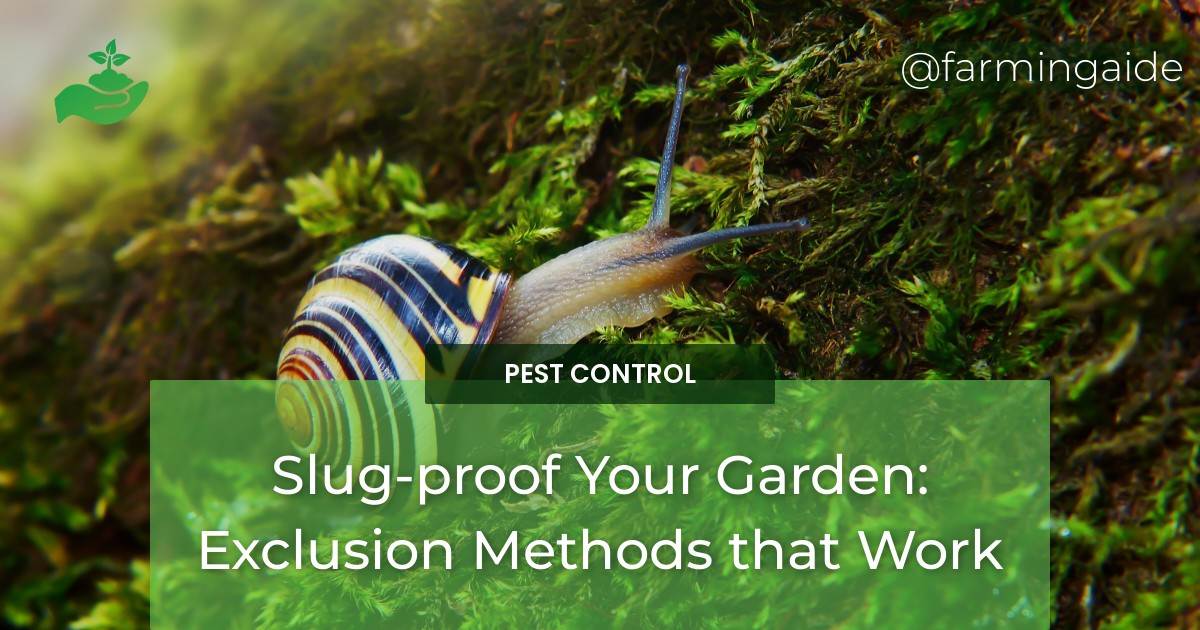Are slugs wreaking havoc in your garden? Are you tired of finding your prized plants destroyed overnight? It’s time to take action and slug-proof your garden! In this comprehensive article, we will explore various slug exclusion methods that work effectively in keeping slugs out of your garden. From raised garden boxes to plastic sheeting barriers, gravel boards, and cloches/row covers, we will cover everything you need to know about these physical slug control techniques. We will discuss the definition, benefits, materials, installation, and maintenance of each method, as well as their advantages and disadvantages. Additionally, we will provide key considerations for effective slug exclusion, best practices for installation and maintenance, and common mistakes to avoid.
By the end of this article, you’ll be equipped with the knowledge to choose the right slug exclusion methods for your garden and bid farewell to these pesky garden pests!
Table of Contents
Raised Garden Boxes
Slug exclusion methods that work often involve creating barriers that prevent slugs from accessing plants. One effective method is using raised garden boxes. These elevated plant beds provide several benefits in addition to slug protection.
Definition and Benefits of Raised Garden Boxes
Raised garden boxes, also known as raised beds, are essentially elevated plant beds that are constructed above ground level. They are typically contained within a frame or structure and filled with soil. The height of raised garden boxes can vary based on personal preference and practicality. These raised beds offer numerous advantages for gardeners:
- Improved drainage: Raised garden boxes allow excess water to drain more efficiently, preventing waterlogged soil that can attract slugs.
- Better soil quality: Gardeners have greater control over the soil composition in raised beds, leading to healthier plants.
- Reduced weed growth: The contained environment of raised garden boxes minimizes weed intrusion, reducing competition for nutrients.
- Easy access: The raised height of the beds eliminates the need for excessive bending or kneeling, making gardening tasks more comfortable.
Materials and Construction of Raised Garden Boxes
When constructing raised garden boxes, various materials can be used, including wood, metal, plastic, or composite materials. Each material has its own advantages and considerations:
- Wood: Cedar and redwood are popular choices due to their durability and resistance to decay. They also have a natural aesthetic appeal.
- Metal: Galvanized steel or aluminum frames offer longevity and can withstand harsh weather conditions.
- Plastic: PVC or recycled plastic materials are lightweight and resistant to rot. They are also more cost-effective.
- Composite materials: These are a combination of wood fiber and recycled plastics, offering the benefits of both materials.
Once you have chosen the material, constructing raised garden boxes involves building a frame and securing it in place. Ensure that the dimensions of the beds are suitable for the plants you intend to grow. Once the frame is in place, fill the beds with a suitable soil mix, and you’re ready to start gardening!
How Raised Garden Boxes Help Exclude Slugs
Raised garden boxes act as effective slug exclusion barriers. The elevated height makes it difficult for slugs to climb up and reach the plants. However, it’s important to ensure that the beds are properly sealed to prevent slugs from accessing the soil through gaps or openings.
Tip: To further enhance slug protection, consider lining the base and sides of the raised garden boxes with a layer of fine mesh or copper tape. The mesh acts as a physical barrier, while copper tape creates a mild electric charge that slugs find unpleasant.
By implementing raised garden boxes, you can create a slug-resistant environment for your plants, allowing them to thrive without the constant threat of slug damage.
Plastic Sheeting Barriers
Another effective slug exclusion method is the use of plastic sheeting barriers. These barriers provide a physical deterrent that discourages slugs from accessing your plants.
Using Plastic Sheeting as a Slug Barrier
Plastic sheeting acts as a simple yet effective slug barrier. By placing a layer of plastic sheeting on the ground around your plants, you create an obstacle that slugs find difficult to navigate. The smooth surface of the plastic makes it challenging for slugs to crawl over, preventing them from reaching your plants.
Installation and Maintenance of Plastic Sheeting
Installing plastic sheeting as a slug barrier involves a few simple steps:
- Clean the area: Remove any debris or weeds from the ground before laying the plastic sheeting.
- Measure and cut: Determine the area you want to cover and cut the plastic sheeting accordingly, leaving a small overlap at the edges.
- Secure the sheeting: Use garden stakes or rocks to anchor the edges of the sheeting, ensuring it stays in place.
Regular maintenance of the plastic sheeting is crucial to ensure its effectiveness:
- Inspect for tears or holes: Regularly check the sheeting for any damage that could compromise its barrier function. Repair or replace damaged sections as needed.
- Remove debris: Clear any fallen leaves or debris that may accumulate on the sheeting, as they can provide hiding spots for slugs.
Pros and Cons of Plastic Sheeting Barriers
Using plastic sheeting as a slug exclusion method offers several advantages:
- Cost-effective: Plastic sheeting is an affordable option for slug control.
- Easy installation: It requires minimal effort and can be quickly implemented.
- Flexible application: Plastic sheeting can be cut to size and used in various garden settings.
However, there are also considerations to keep in mind:
- Visual impact: Some gardeners may find plastic sheeting less aesthetically pleasing compared to other exclusion methods.
- Environmental impact: The use of plastic raises concerns about its long-term impact on the environment.
Overall, plastic sheeting barriers provide a simple and cost-effective solution for slug exclusion.


